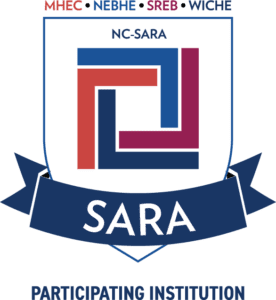Accreditation
ESR is accredited by the Commission on Accrediting of the Association of Theological Schools in the United States and Canada, and the following degree programs are approved: M.Div./M.Min., M.A. in Religion, M.A. in Peace & Social Transformation, and M.A. in Theopoetics & Writing.
Approved for a Comprehensive Distance Education Program.
The Commission contact information is:
The Commission on Accrediting of the Association of Theological Schools in the United States and Canada
10 Summit Park Drive
Pittsburgh, PA 15275
Telephone: 412-788-6505
Fax: 412-788-6510
Website: www.ats.edu
Regional accreditation: Higher Learning Commission of the North Central Association as part of Earlham College.

Earlham School of Religion has been approved to participate in the National Council for State Authorization Reciprocity Agreements.
Distance education students residing in other states may contact the Indiana Commission for Higher Education concerning complaints after having completed ESR’s student complaint process.
Statement of educational effectiveness
Earlham School of Religion’s mission to prepare theologically diverse students for a pluralistic world through a curriculum that unites spiritual formation, academic study, social engagement, and vital ministry carries with it a commitment to educational programs that effectively accomplish this goal. To ensure this is the case, ESR has developed a robust assessment process for its M.A. and M.Div. graduate degree programs overseen by a Program Assessment Committee that includes administrative and teaching faculty, as well as a representative from our partner school, Bethany Theological Seminary. This process involves review of a wide range of measures including retention, completion, and vocational placement rates, entering and graduating student surveys, alumni/ae and employer surveys, and a formal review of capstone course rubric scores and sample assignments. This page is maintained by the Program Assessment Committee.
Part of the program assessment process involves the recognition of the limitations of these measurements. Satisfaction with a program, for instance, may or may not correlate to academic success. From another angle, successful discernment may for some students mean that they are not called to complete a graduate degree. Nonetheless, it is our hope that through the use of a variety of measures we can gather a picture of overall effectiveness as well as areas for continued growth and development.
The data presented in the PDF below is organized into three broad categories: program completion, vocational placement, and student satisfaction.